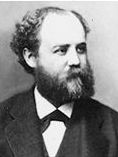This “solar pressure” compares with the well-known China pressure, and seems like a genuine symptom. The weak heart is a very common accompaniment of Neurasthenia.
CHININUM SULPHURICUM, according to the confirmed provings of Otto Piper, causes an excellent picture of Neurasthenia; Despondency. Aversion to mental labour. Mental confusion. Lustreless eyes; dim vision; sensitive to the glare of light. Noises in the ears. Sickly expression. Oppression of the epigastrium from flatus; abdomen distended. Difficult stool from inertia. Urine contained phosphates. Sexual depression. Oppression of the chest with tenderness of third dorsal vertebra. Sticking in the apex of the heart. Sensitiveness of the last cervical and first dorsal vertebrae; dorsal most sensitive during the chill; limbs weak, feel bruised, feel numb and trembling on slight exertion. Sensation during stool as if, drops of fluid passed from right hand to shoulder. Emaciation. Weak and dull after a siesta. Excessive general sensitiveness of the body. Sleep unrefreshing. Sleepless. Chill, with tender dorsal spine. Heat of the face.
The only evidence that the drug causes sensitiveness of the lumbar vertebre is contained in the remark by the prover that during chill the dorsal vertebrae are more sensitive than either the cervical or the lumbar.
Finally, the sort of pain experienced is sometimes of importance. The pains of Neurasthenia simulate those of Ataxia, but are transient, usually less severe, and referred to the lumbo-sacral region only. Ipomoea helps, especially when they provoke nausea; Sulphur when there are transverse stitches; Natrum Mur. with cutting through the back: Zinc cutting down into the legs; Sepia pains go around like Pulsatilla, Berberis, etc., or down the thighs; Gelsemium when there is severe pain extending into the hips. Bruised sensation is common to nearly all. Tension is marked in Zinc, Nux vomica, Sulphur, Natrum Mur. and Valerian; while sensation of a band is very characteristic of Pulsatilla.
The lumbar spine is sensitive in Phosphorus, Agaricus, Bryonia, Lycopod., Pulsatilla, Sepia, Arsenic, Alumina.
Those who suffer from lumbar weakness should avoid tea, as it tends to increase the disease.

